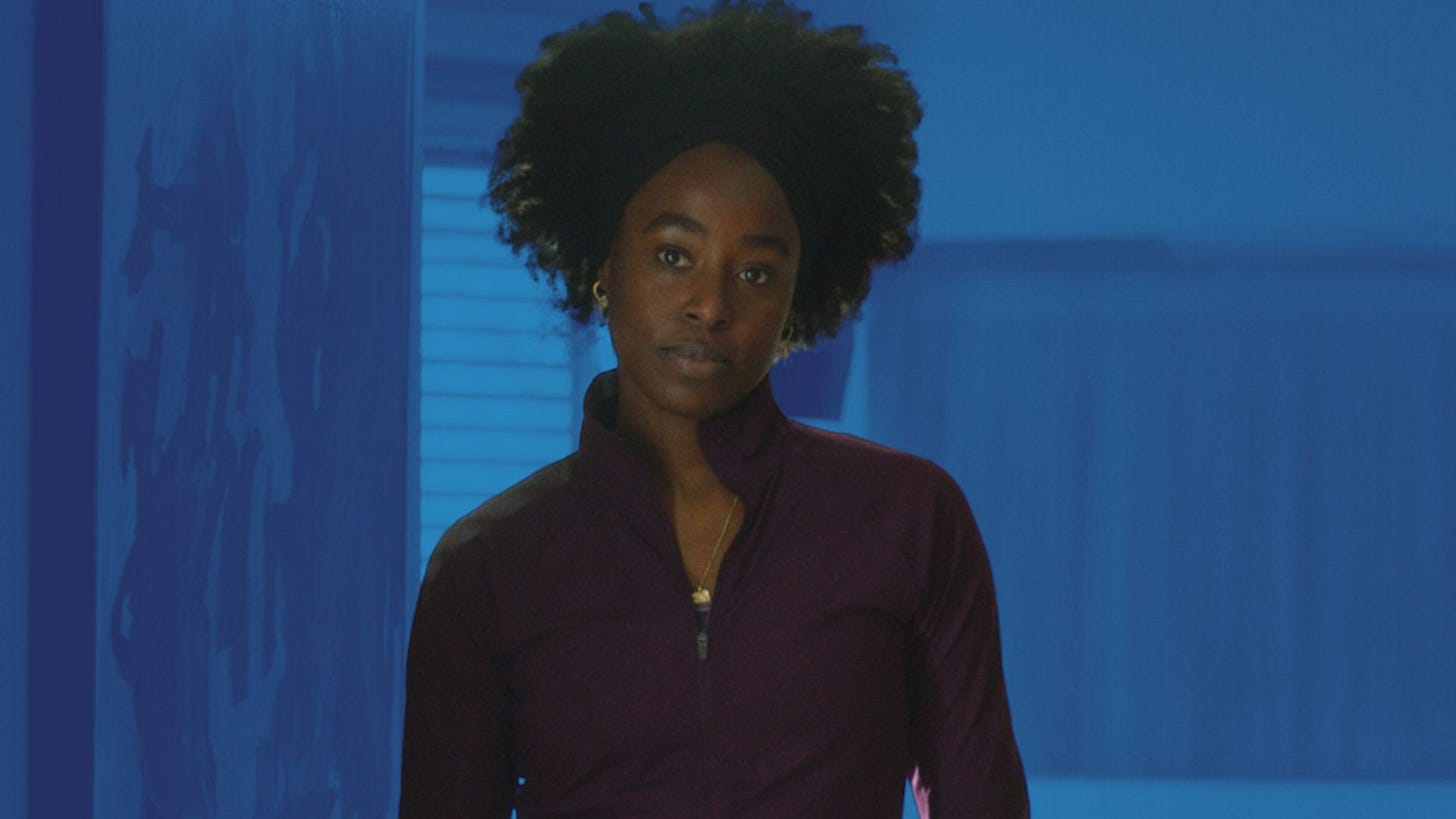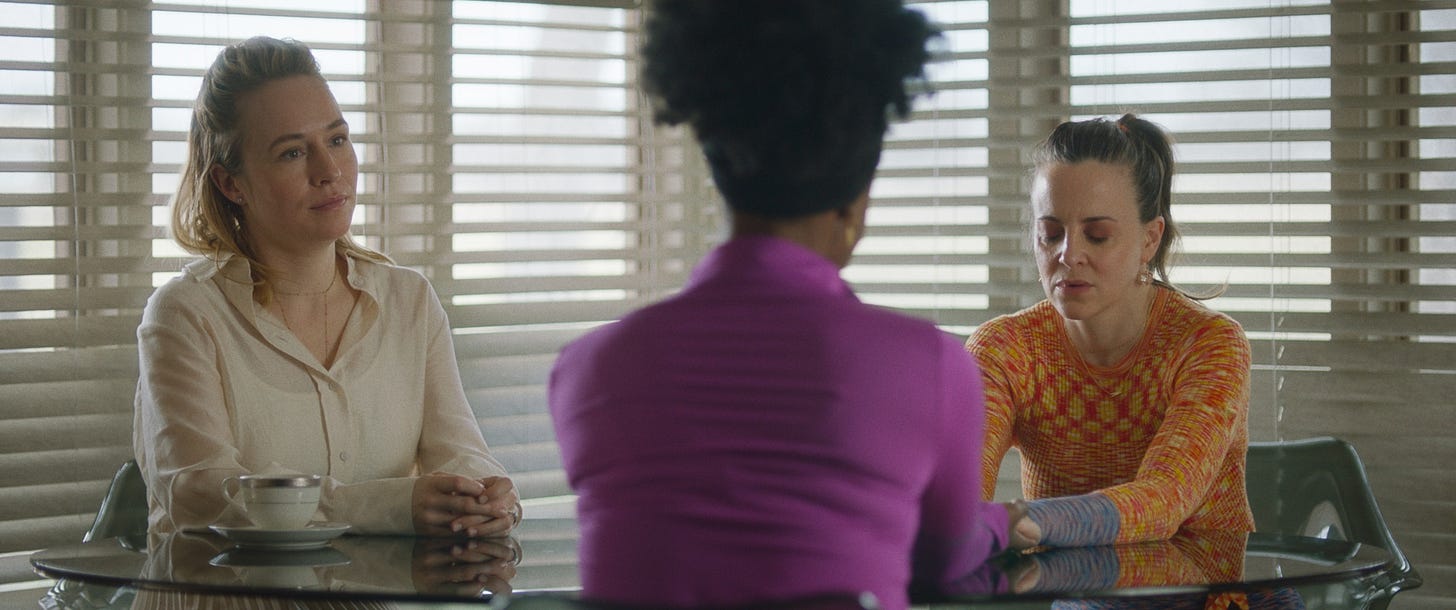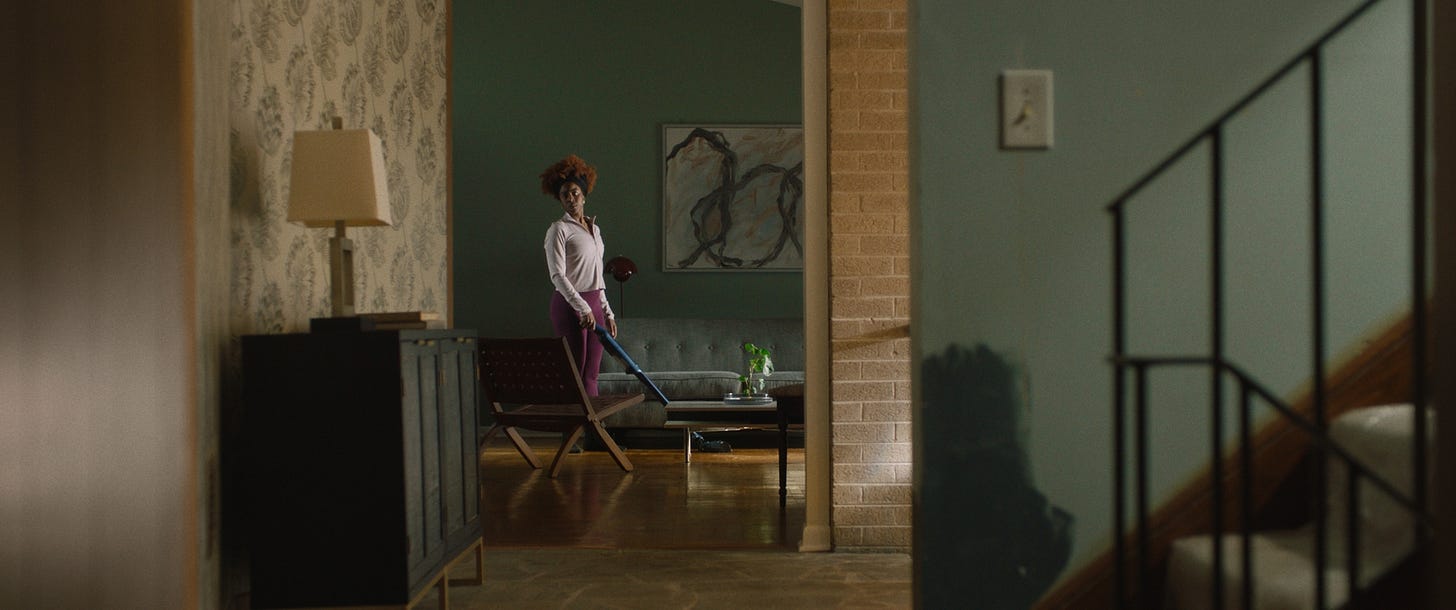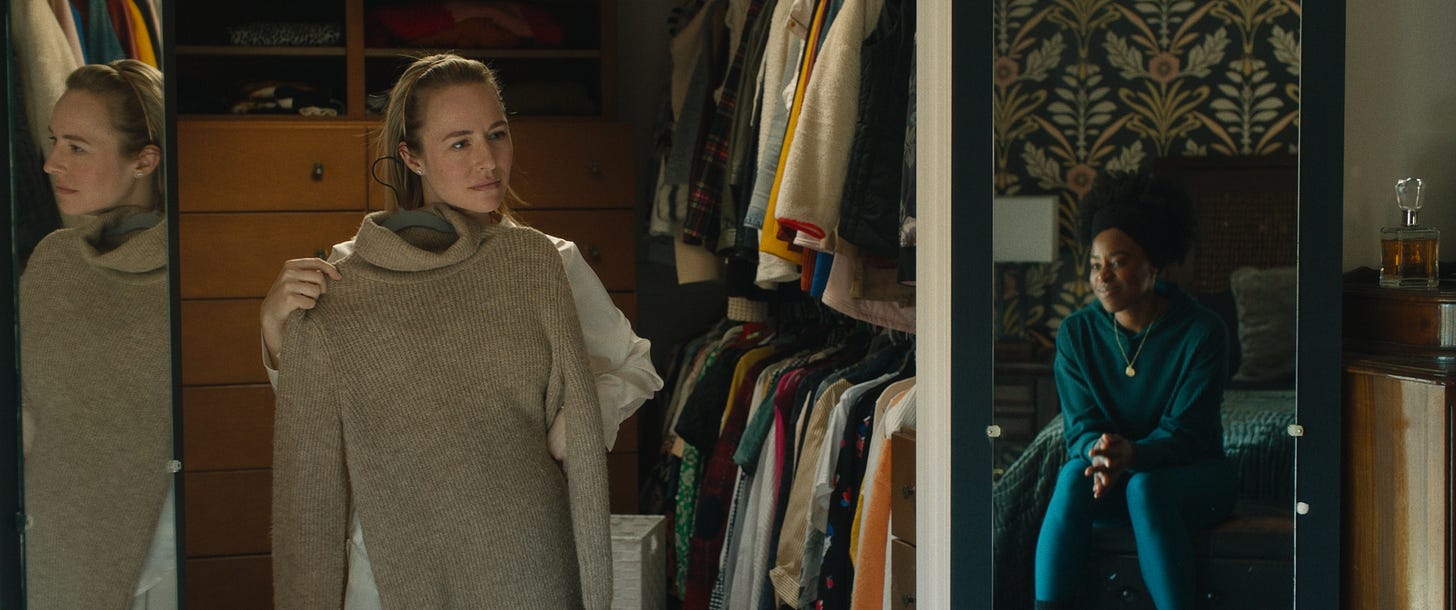We Strangers: Finding Meaning in Life’s Messes
How Anu Valia’s debut film wrestles with assimilation, spiritual hunger, and the fog of life
I was shocked to learn recently that more than half of 13-25 year olds regularly practice tarot cards or fortune telling. The number points to the rise of a new kind of spirituality, one distrusting of institutional religion yet still hungry for meaning.
Anu Valia’s debut feature We Strangers seems to emerge from this new age spiritual movement. Where past films like Elmer Gantry or Wise Blood show characters exploiting others from within religious institutions, Valia’s film uses the increasing popularity of clairvoyance to raise questions of belonging, identity, exploitation, and spiritual searching.
The film follows Ray (Kirby Howell-Baptiste), a young commercial cleaning woman who is offered a second job cleaning the homes of several rich, suburban families. To blend into her new surroundings, she lies about being a clairvoyant, which then flips the power dynamic in curious ways.
Now thrust into an unofficial role as community psychic, she begins providing vague and clichéd words to speak to her employers’ grief and loneliness, and in the process uncovers both the power and the peril of offering empty sustenance to those desperate for meaning.
I had the pleasure of interviewing writer and director Anu Valia, and our discussion turned to the key themes that make We Strangers so haunting: spiritual searching, the compromises of assimilation, and the cinematic choices that give the story its uneasy, dreamlike tone.
Slight spoilers to follow.
Blindness and Black Holes
Much of We Strangers is about the restlessness of people searching. Searching for relief from grief, for escape from unhappiness, for belonging in a world that has pushed them aside. Having grown up Sikh, Valia is deeply aware of the universal drive behind such searching. “All people want to find meaning and purpose in life, right?” she reflected.
That spiritual hunger is ever-present in We Strangers, from the eerie emptiness of the production design’s suburban homes to the longing eyes (framed straight down the camera) of those who ask Ray for guidance. Ray exhibits many of these longings herself, but her claims of being psychic make her a vessel onto which people project their spiritual need.
Valia was quick to point out in our interview that Ray never outright lies in her clairvoyant sessions. Instead, she uses these faux spiritual readings to speak to, as Valia says, “black holes inside, and people's disconnect from the meaning of their lives. And these people, who are a little bit blind, love that about her.”
But this blindness often has unintended consequences. Sure, sometimes Ray’s words can provide peace to those in need, such as telling Jean (Maria Dizzia) vaguely comforting words about a deceased relative. On other occasions, however, this psychic advice leads to questions of identity and relationships.
Ray tells Tracy, the wife of her employer Dr. Patel, “You have a darkness. There’s just a hole that’s empty. You’ve gotta find a way to fill this hole, or this darkness is just gonna consume you.”
As she speaks, the edit sporadically cuts to a pitch-black void, flashing between straight-on shots of Ray and Tracy. This dark, empty image visualizes Ray’s own counterfeit spirituality (she isn’t actually seeing anything), but also resonates with Tracy, who feels the emptiness inside that Ray names.
Things escalate quickly when Ray later finds out that Tracy has left her husband, no doubt a result of Ray’s words to her. Dr. Patel insists it’s temporary, but the tremor in his voice betrays his doubt. But days later, Ray discovers Tracy back home in bed, withdrawn and unsettled.
Tracy: “I didn’t really feel different or anything else, so I came home.”
Ray: “Did you get what you wanted?”
Tracy: “I don’t know.”
Tracy has risked everything in an attempt to fill the hole inside of her, only to discover her escape still didn’t add meaning to her life. Are Ray’s words to blame? Is vague, impersonal advice safe to offer, or does it function the same as a lie?
We Strangers is reminiscent of biblical warnings about those who soothe without true healing. The prophet Jeremiah condemned spiritual leaders who offered false comfort: “The prophets and priests cannot be trusted. All they ever offer to my deeply wounded people are empty hopes for peace” (Jeremiah 6:13-14). In the New Testament, Paul echoed a similar danger, saying people “will gather around them a great number of teachers to say what their itching ears want to hear” (2 Timothy 4:3).
Ray becomes one of those teachers, not maliciously, but in a way that shows just how easy it is to meet spiritual hunger with empty words. Lie or truthful platitude, the effect is the same.
Assimilation and Belonging
If Ray’s fake psychic readings show her at her most morally questionable, her daily work shows her at her most vulnerable. She is the outsider in the homes she cleans, the employee in a world of employers who will never fully invite her in.
Her occupation in the film is no coincidence either. Ray’s job as a cleaner is all about cleaning up the literal messes of others, but as the film goes on it seems like she's also tasked with tidying their spiritual and emotional clutter.
Religion and assimilation have often been intertwined in history. Some immigrant communities were pressured to conform to dominant religious practices in order to belong. Indigenous peoples have been forced into religious conversion as a way of erasing their identity. As I pointed out in an analysis of Black Narcissus, assimilation has occasionally been prized over salvation in missions work.
We Strangers hits on that same dynamic. Is Ray claiming to be a psychic to maliciously deceive others, or because it may lead to acceptance within the community she works for? It would appear the latter. She’s adapting the prevalent form of spirituality among her employers to become a part of their community. As Valia put it, “The decision — which is not that conscious, to just tell this lie that spins out of control — comes from feeling like you are just a fly on the wall and you don't matter at all.”
In this way, Ray’s code-switching is less a con game than a survival tactic. Kirby Howell-Baptiste brilliantly portrays these complicated feelings, whether it’s through Ray’s practiced (almost forced) smile, her reluctant agreeability, or her carefully chosen tone when speaking.
Valia, who grew up in Indiana where the film is set, admitted this theme was personal: “The feeling of the movie is this idea of what assimilation does to a person, what it feels like to be a chameleon. I connect deeply with that.”
Throughout the film, Valia punctuates Ray’s experiences with cutaway shots to a looming volcano. This imagery is rooted in a story Ray tells about the eruption of Mount Pelée, where the entire town perished except for a single prisoner trapped underground. The allusion is clear: Ray’s marginalization has “trapped” her beneath the social mountain, but it’s also made her a survivor. And as the privileged world around her begins to collapse and search for meaning, she is trying to find ways to adapt and survive.
This sad but powerful metaphor reframes our entire perspective of Ray’s situation, beliefs, and actions. Her invisibility is not of her own making; it is imposed by the families who overlook her. In a sense, Ray’s clairvoyant act is just another result of a culture that will not grant her status unless she performs.
“How is this person using her ability to assimilate, to code-switch, to tell people what they want to hear, to gain access in a place that does not want to give her access?” Valia asked. “That was at the forefront of my mind.”
Searching for Answers
All of these themes — the longing, the exploitation, the assimilation — are held together by the film’s atmosphere.
Valia wanted the film to feel “dreamlike, almost like a memory.” That feeling is heightened by the recurring volcanic intercuts, sudden editing shifts, and tight close-ups of Ray cleaning, and contributes to the sense that we are watching the characters futilely grasp for clarity.
Working with longtime collaborator James Codoyannis, Valia crafts an aesthetic that is ethereal, yet grounded. “We were really conscious and desiring to make a movie that was in the third-person subjective,” she explained. “I want you to feel for Ray and really look at the world through Ray's eyes, but ... we’re still watching her with a little remove, kind of being like omniscient watchers. It's supposed to feel like you enter this fog. Everything that's happening is true and real, but there's still something a bit hazy about it.”
The fog Valia so brilliantly depicts lulls the viewer into a disorienting sense of timelessness, which admittedly causes the ending of We Strangers to feel like an abrupt and unsatisfying resolution to a story full of fog and questions. And yet in that refusal to resolve, the film does its sharpest work. It reflects a culture that feels the ache of eternity but searches in vain for answers.
At the end of our interview, Valia described her directorial role as being a caretaker of the film, allowing it to “become its own thing” rather than fully controlling it. We Strangers mirrors that same caretaker role: it reflects society rather than dictates it. It shows us hunger and separation, pushing us to ask where true meaning and belonging is found.
Jesus’ words in Matthew 11 feel like the counterpoint to Ray’s rocky guidance: “Come to me, all you who are weary and burdened, and I will give you rest.” The fragile reassurances of Ray’s psychic readings cannot offer peace. The compromises of assimilation cannot grant true belonging. Christians know that only Christ promises the rest and purpose these characters seek but cannot find.
Until then, We Strangers lingers with the viewer like that half-remembered dream: searching, questioning, restless. It’s a strong directorial debut, and it left me excited to see what future cinematic questions — and perhaps answers — Anu Valia has in store.





